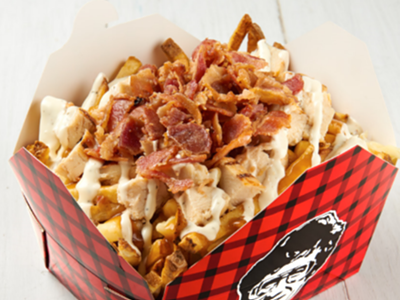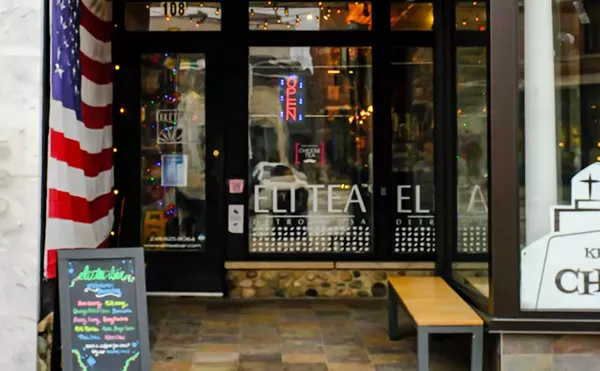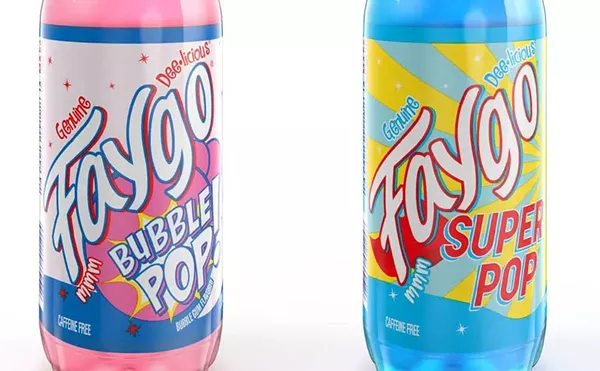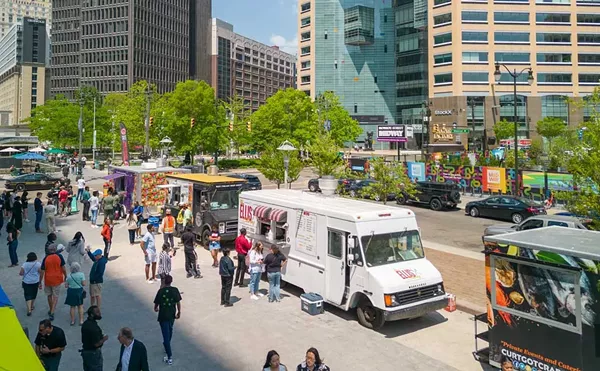It's tough to think of many restaurants eliciting the level of fanfare and hype that we saw when Shake Shack started serving downtown Detroit in February. Dozens of articles preceded the event, and, when the day arrived, lines extended out the door and up Woodward. As the Free Press wrote of the grand opening: "Customers were excited to see the burger chain open, clapping, cheering, and giving high-fives to employees as they walked in."
The lines continued for a few days, and still aren't uncommon. The chain even recently announced a second Michigan location, to open in Troy later this year. But for those of us who had never tried Shake Shack, we wondered: What is it that rolls out of its kitchen that drives people to stand outside in the middle of a Michigan winter just so they can be among the first to eat there? Could it be that good that I would forego my lefty sensibilities and start eating at a New York City-based chain with 127 stores worldwide instead of sticking with my favorite local flavors?
Many said I would while offering assurances that it serves some of the globe's best burgers. Beyond that, they praised it for its corporate aesthetic and called it a "good chain." They note that Shake Shack partners with local businesses like Zingerman's. It uses non-GMO buns. It uses better ingredients, like Angus beef. It has in place an animal welfare policy. John Varvatos designed its limited edition Detroit T-shirts. It's a product of hip NYC restaurateur Danny Meyer. It's the antithesis of Chic-fil-A.
Our verdict? It's... well... it's fast food.
Certainly not throw-around-high-fives-in-the-freezing-cold good.
Yes, it reaches a certain threshold, and arguably beats McDonald's, Wendy's, Five Guys, or Sonic. But that's a low bar and — especially at the price and wait — it's not better or more deserving than the nearby Grand Trunk, Parc, Dime Store, American, Lunchtime Global, Checker Bar, or any of the dozen food trucks that hang around Campus Martius that are part of Detroit's identity.
All that said, I would sell out for the right burger, and if the food truly exceeded Detroit's other options in quality.
But Shake Shack isn't nearly that convincing. A common descriptive that accompanies its Shakeburger ($5.39) patties is "juicy," though I found it more in line with a standard fast food patty — a salty, greasy, thin disc that's gristly at times. Shake Shack boasts that its patties are cut from Angus beef, which, in America, implies quality. But the "Angus" mark doesn't actually inform about quality. It indicates the type of cow, and quality is determined by the USDA-defined grades — prime, choice, select, commercial, utility, and cutter. Labeling meat "Angus" without "prime" is a common marketing stunt restaurants will use to make you think you are eating something of higher quality than it may be.
Like the burger, the fried Chick'n Shack ($6.49) is highly salty and greasy enough to leave my hands slick, but the pickles, lettuce, and buttermilk herb mayo worked well, and, it's encased in a solid coating of craggily batter. It and the other meats arrive on a soft and slightly chewy potato bun, which works fine for the task. Not a bad package.
Following form, the Shack-cago Dog's (a Chicago dog) main flavor was salt, which is presumably the result of an over-generous portion of celery salt. It didn't come with any of the "neon" relish, but it's a good effort for a $4.29 Chicago dog made by a New York City-based company in Detroit. The accompanying fries are thick and crinkle cut. Not my favorite variety, but they were crisp.
Shake Shack's "Concretes" are the part of the menu in which it partners with Michigan companies, mixing frozen custard and local flavors. Among them is the Motor City Mix (vanilla custard, peanut butter sauce, Bon Bon Bon's dark chocolate with Rocky Peanut honey-roasted peanuts and chocolate toffee) and others featuring flavoring from Zingerman's, or a slice of seasonal pie from Sister Pie.
And that's where Shake Shack peaks. Otherwise, it's not much different than other fast food fare, though maybe it wasn't always that way. A coworker who first tried a cheeseburger made at the original NYC location in 2004 called it the best he has ever had. "Well, this is different," he said upon tasting one from the downtown Detroit location. Perhaps that's what happens when a restaurant opens 127 locations — the product suffers. There's something to be said about the business owner who is satisfied with quality and doesn't feel the need to open a restaurants on every block in America, leaving the company a caricature of what it once was and further homogenizing our cities. If one needs greasy burgers in Detroit, then Telway can help.
As for the "good chain" question — that's mostly marketing at work. Shake Shack doesn't claim to be a local business, but as the company's culinary director put it, "we want (the customer's) visit to feel like one, even though it's a chain." The faux local angle is designed to capitalize off of consumers' desires to support mom and pops. Having a big brand appropriate that seems to fall somewhere on the spectrum between cheesy and slimy.
However, it seems true that Shake Shack is in some ways a "good chain." Its animal welfare policy, for example, is wonderful, and in a sane world all restaurants — from national chains to mom and pops — would have one in place. And the local partnerships are a nice thing. But if I'm going for taste, then there are other spots in Detroit where I'll wait in line before Shake Shack.







